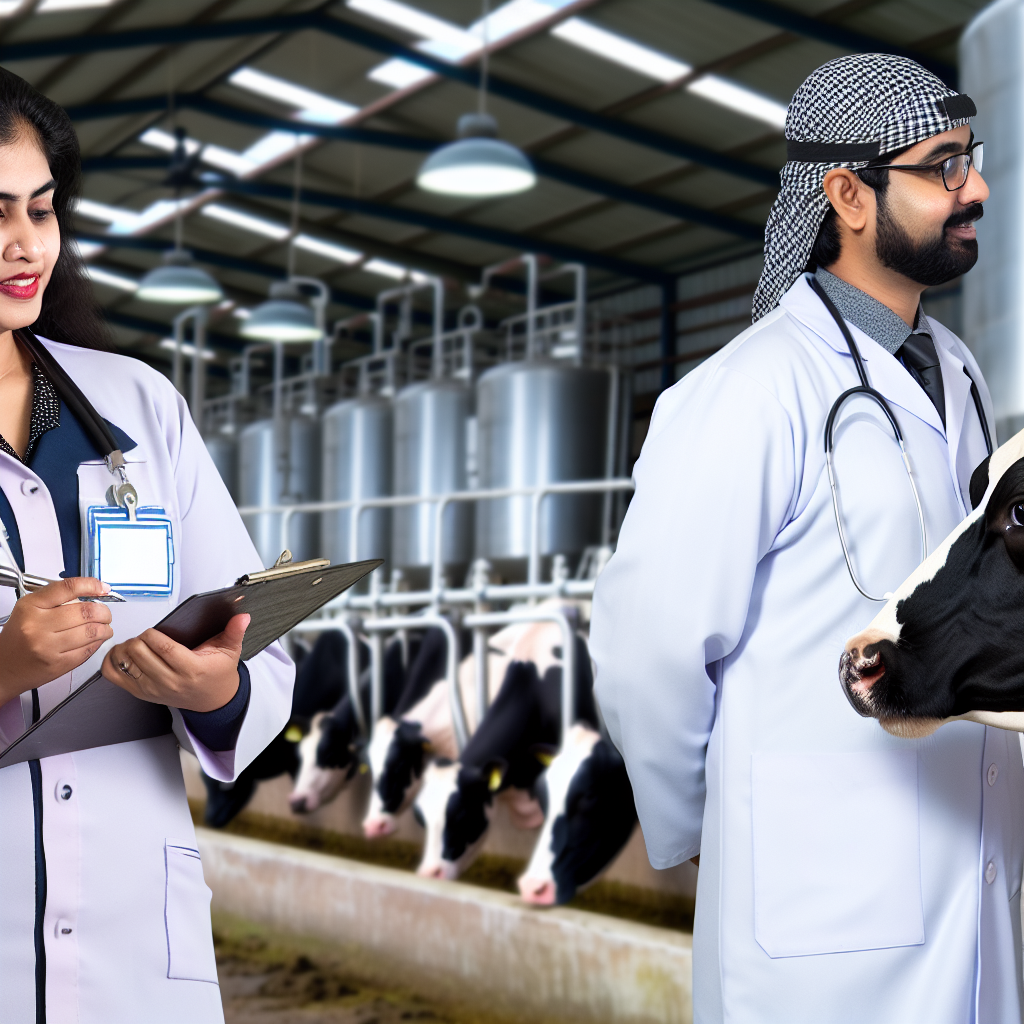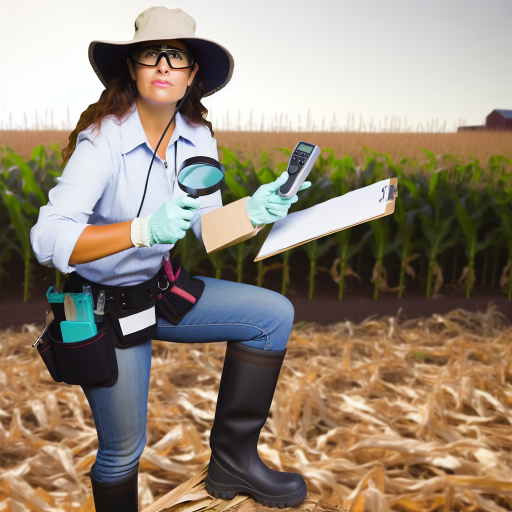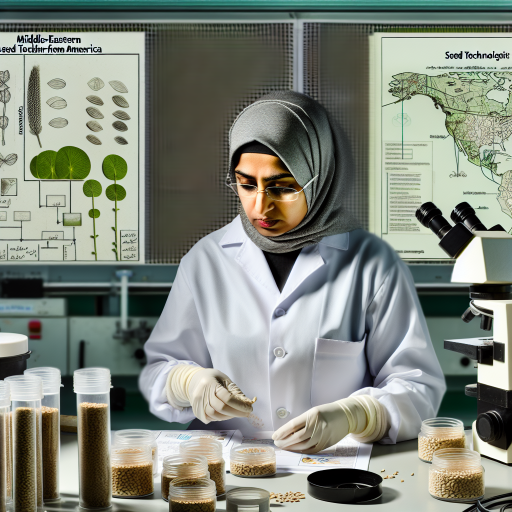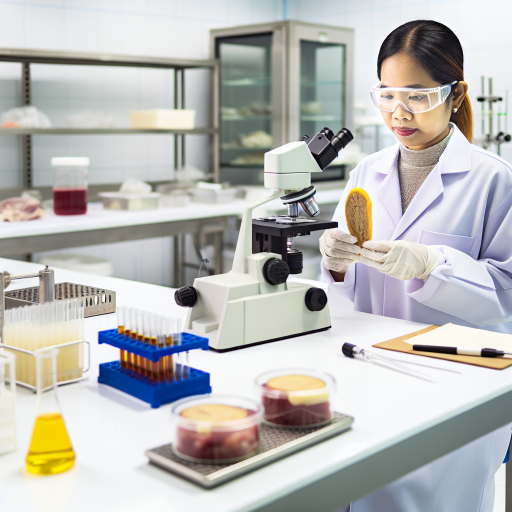Introduction:
A brief overview of the importance of veterinary collaborations in dairy science cannot be overstated.
Veterinarians play a crucial role in various areas within the dairy industry.
They are essential for ensuring the health and well-being of dairy cattle, monitoring reproduction, and managing infectious diseases.
Moreover, veterinarians provide valuable expertise in nutrition, genetics, and overall herd management to optimize production efficiency.
Collaboration between veterinarians and dairy scientists is vital for enhancing animal welfare and ensuring the sustainability of dairy operations.
Through their knowledge and skills, veterinarians contribute significantly to the success and profitability of dairy farms around the world.
In summary, veterinary collaborations in dairy science are essential for advancing research, promoting best practices, and ultimately improving the quality of dairy products for consumers.
Role of Veterinarians in Implementing Preventive Care Strategies
Veterinarians are trained professionals who specialize in animal health and welfare.
They play a key role in developing and implementing preventive care programs.
These programs focus on disease prevention, nutrition, and overall herd management.
By working closely with dairy farmers, veterinarians can identify potential health risks.
They also develop proactive strategies to mitigate these risks.
One of the main responsibilities of veterinarians is conducting regular health assessments.
They monitor the overall well-being of the herd through routine physical exams.
Vaccinations and deworming schedules prevent common diseases and parasites.
Additionally, veterinarians provide valuable insights into nutrition management.
They also advise on herd biosecurity and breeding practices.
This guidance improves the overall health and productivity of the herd.
Benefits of Proactive Health Management in Dairy Farms
Implementing proactive health management practices offers many benefits.
- Reduced risk of disease outbreaks: Regular health monitoring helps reduce outbreaks.
- Improved animal welfare: Proactive management ensures animals are healthy and comfortable.
- Increased productivity: Healthy cattle produce higher milk yields and have better reproduction.
- Cost savings: Preventive care reduces veterinary costs associated with treating diseases.
- Enhanced reputation: Proactive practices help farms build a reputation for animal welfare.
The collaboration between veterinarians and dairy farmers is essential for effective care.
Transform Your Career Today
Unlock a personalized career strategy that drives real results. Get tailored advice and a roadmap designed just for you.
Start NowThey work together to implement strategies promoting the health of dairy cattle.
This teamwork focuses on preventive measures and early detection of health issues.
Furthermore, it supports sustainable farming practices.
Early Detection of Diseases
Veterinarians conduct routine health checks on dairy cattle to identify any signs of diseases.
Through physical examinations and laboratory tests, veterinarians can detect illnesses in their early stages.
They monitor the herd for symptoms such as weight loss, decreased milk production, and changes in behavior.
By recognizing diseases early, veterinarians can prevent the spread of illnesses within the herd.
Early detection allows for prompt treatment, minimizing the impact of diseases on individual animals and the entire herd.
Treatment of Diseases
Once a disease is identified, veterinarians develop a treatment plan tailored to the specific illness.
They may prescribe medications, recommend dietary changes, or provide other forms of medical intervention.
Veterinarians oversee the administration of treatments and monitor the progress of affected animals closely.
They may also implement biosecurity measures to prevent the spread of contagious diseases within the herd.
Veterinarians collaborate with dairy farmers to ensure that treatment protocols are followed effectively.
Impact of Timely Intervention
Timely intervention by veterinarians can significantly improve the health outcomes of dairy cattle.
Early treatment of diseases can prevent complications and reduce recovery time for affected animals.
Healthy cows are more productive, leading to higher milk yields and better overall herd performance.
Timely intervention minimizes the economic losses associated with illnesses in dairy cattle.
By maintaining the health of the herd, veterinarians contribute to the sustainability of the dairy operation.
The expertise of veterinarians in disease detection and treatment is invaluable to the dairy industry.
Showcase Your Business Today
Reach thousands of readers actively exploring professional services. Publish your business profile and grow your audience now.
Publish NowTheir proactive approach to identifying and managing illnesses in dairy cattle safeguards animal welfare.
This approach ensures the productivity and profitability of dairy farms.
Through effective collaboration with dairy farmers, veterinarians play a crucial role in maintaining the health and well-being of the herd.
Ultimately, they contribute to the success of the dairy enterprise.
Gain More Insights: Creating a Sustainable Farm Business Model
Reproductive Health Management:
Importance of veterinarians in managing reproductive health in dairy cattle:
- Veterinarians play a crucial role in ensuring the reproductive health of dairy cattle.
- They perform routine checks and tests to monitor the reproductive status of the animals.
- Early detection of reproductive issues can prevent potential problems and enhance overall herd productivity.
- Veterinarians are trained to identify and treat reproductive disorders in dairy cattle effectively.
- They can provide guidance on nutrition, breeding practices, and overall management to optimize fertility.
- By developing customized reproductive health programs, veterinarians help maximize the breeding potential of dairy cattle.
How veterinary collaboration can improve breeding programs and increase efficiency:
- Collaboration between veterinarians and dairy farmers can lead to more precise breeding strategies.
- Veterinarians can provide valuable insights into animal genetics and reproductive physiology to enhance breeding programs.
- By working together, veterinarians and farmers can identify and address reproductive issues promptly.
- Veterinarians can offer expertise in artificial insemination techniques and estrus synchronization to improve breeding efficiency.
- Regular consultation and collaboration with veterinarians can help farmers make informed decisions regarding breeding practices.
- Through shared knowledge and resources, veterinary collaborations can contribute to better reproductive outcomes in dairy cattle.
Collaborating with veterinarians for reproductive health management in dairy cattle is essential for ensuring herd productivity and sustainable breeding programs.
Delve into the Subject: Agricultural Labor Jobs for Veterans: Opportunities and Support
Role of Veterinarians in Developing Nutrition and Diet Plans
Veterinarians have extensive knowledge of animal physiology and nutritional requirements.
They create customized diet plans for dairy cattle.
Factors such as age, breed, weight, and overall health status are taken into account.
Through regular health assessments and monitoring, veterinarians adjust diet plans as needed.
This ensures optimal health for the animals.
They also consider any specific health conditions or dietary restrictions.
Impact of Proper Nutrition on Milk Production and Herd Health
Proper nutrition is directly linked to milk production in dairy cattle.
When animals receive the right balance of nutrients, their overall health improves.
This leads to increased milk yield.
A well-planned diet also helps prevent diseases and health issues within the herd.
By ensuring that cattle receive all essential nutrients, veterinarians maintain a healthy immune system.
This helps prevent deficiencies that can impact productivity.
In addition to milk production, proper nutrition plays a key role in reproductive health.
A balanced diet can improve fertility rates and increase the chances of successful pregnancies.
This ultimately leads to a sustainable and profitable operation.
The expertise of veterinarians in nutrition and diet planning is essential for the success of dairy farms.
By tailoring diet plans to meet the specific needs of cattle, these professionals contribute to increased productivity.
They also help improve herd health.
Delve into the Subject: Innovative Irrigation Techniques for Specialists
Biosecurity and Disease Prevention
The role of veterinarians in implementing biosecurity measures is crucial to prevent disease outbreaks in dairy farms.
By collaborating with farmers, they can create a robust plan to safeguard the health of the herd.
Importance of Biosecurity Measures
Biosecurity measures are essential to prevent the introduction and spread of infectious diseases in dairy farms.
Veterinarians play a key role in designing and implementing these measures to ensure the overall health and well-being of the animals.
Some of the key biosecurity measures that veterinarians may recommend include:
Collaborative Efforts for Disease Prevention
Collaborative efforts between veterinarians, farmers, and other stakeholders are crucial in maintaining a healthy environment for the dairy herd.
By working together, they can establish effective disease prevention strategies and ensure the implementation of best practices.
Some key ways in which collaborative efforts can help in disease prevention include:
Biosecurity measures and collaborative efforts are essential components of disease prevention in dairy farms.
By working together, veterinarians and farmers can create a healthy and sustainable environment for the herd.
This ensures the welfare and productivity of the animals.
You Might Also Like: Understanding Irrigation Scheduling and Management
Showcase Your Business Today
Reach thousands of readers actively exploring professional services. Publish your business profile and grow your audience now.
Publish Now
Training and Education:
Continuous training is crucial for dairy farmers and veterinarians to stay updated.
Ongoing education ensures that best practices are implemented on dairy farms.
Regular training sessions help farmers understand the latest advancements in dairy science.
Veterinarians need to constantly update their knowledge to provide optimal healthcare for livestock.
Importance of Continuous Training and Education:
Continuous training and education play a pivotal role in the success of dairy farming operations.
Both dairy farmers and veterinarians must engage in ongoing learning to keep pace with the evolving industry trends and technological advancements.
For dairy farmers, continuous training equips them with the necessary skills and knowledge to effectively manage their dairy herds, improve milk production, and maximize profitability.
Training programs cover a wide range of topics such as animal nutrition, reproduction, health management, and hygiene practices.
Veterinarians, on the other hand, need to consistently update their knowledge and skills to provide the best possible care for dairy cattle.
Continuous education allows them to stay abreast of new diagnostic tools, treatment options, and disease prevention strategies, ultimately enhancing animal welfare and farm productivity.
Knowledge Sharing and Collaboration for Improved Dairy Practices:
Collaboration between dairy farmers and veterinarians facilitates the exchange of information, expertise, and best practices, leading to enhanced dairy production and animal health outcomes.
By sharing knowledge and working together, both parties can drive improvements in dairy practices.
Through collaborative efforts, dairy farmers can benefit from the specialized veterinary knowledge and experience of veterinarians.
Veterinarians can offer valuable insights and recommendations on disease prevention, treatment protocols, and overall herd health management, empowering farmers to make informed decisions for their operations.
Knowledge sharing also fosters innovation and encourages the adoption of sustainable farming practices.
By collaborating on research projects or implementing new technologies, dairy farmers and veterinarians can collectively contribute to the advancement of the dairy industry, promoting efficiency, sustainability, and animal welfare.
Continuous training and education are essential for both dairy farmers and veterinarians to thrive in the dynamic field of dairy science.
By embracing lifelong learning and fostering collaboration, stakeholders in the dairy industry can achieve sustainable growth, improve animal health and welfare, and ensure the production of high-quality dairy products.
Technology Integration:
Veterinary collaborations play a crucial role in integrating technology for monitoring dairy cattle health.
By working with veterinarians, dairy farmers can leverage advanced tools for early detection of health issues.
Monitoring devices such as activity trackers and rumination sensors can provide real-time data on cow behavior.
This data helps in identifying changes in eating patterns or activity levels, indicating potential health problems.
Veterinarians can interpret this data to make informed decisions about the health and well-being of the cattle.
Benefits of Using Data-Driven Approaches:
Implementing data-driven approaches in dairy science allows for more precise decision-making based on real-time information.
By analyzing data on individual cow performance, veterinarians can tailor treatment plans and preventive measures.
Data-driven approaches enable proactive management of herd health, reducing the risk of disease outbreaks.
Monitoring parameters such as milk production, body condition score, and reproductive performance can help in early disease detection.
By leveraging technology and data analytics, dairy farmers can optimize their management practices for improved productivity.
Collaboration Between Veterinarians and Dairy Scientists
The collaboration between veterinarians and dairy scientists is crucial for the sustainable and efficient production of dairy products.
By working together, veterinarians can ensure the health and well-being of dairy animals, leading to higher milk production and quality.
Moreover, veterinarians play a key role in disease prevention and early detection, which are essential for maintaining a healthy herd.
Their expertise in animal nutrition and welfare also contributes to the overall success of dairy farming operations.
The partnership between veterinarians and dairy scientists contributes to the success of the dairy industry by promoting animal health, welfare, and productivity.
This collaboration is vital for meeting the increasing demand for dairy products while ensuring sustainability and efficiency in dairy production.
Veterinary collaborations in dairy science are beneficial for the industry and consumers, resulting in high-quality, safe dairy products.
By emphasizing the importance of this partnership, we can continue to support a thriving dairy industry that meets the needs of society in an environmentally conscious manner.
Additional Resources
Animals in Teaching and Research at Cornell University | Cornell …
[E-Books for Sale]
The Big Book of 500 High-Paying Jobs in America: Unlock Your Earning Potential
$19.99 • 500 High-Paying Jobs • 330 pages
Explore 500 high-paying jobs in America and learn how to boost your career, earn more, and achieve success!
See All 500 High-Paying Jobs of this E-Book
1001 Professions Without a Degree: High-Paying American Jobs You Can Start Now
$19.99 • 1001 Professions Without a Degree • 174 pages
Discover 1001 high-paying jobs without a degree! Unlock career tips, skills, and success strategies for just $19.99!




